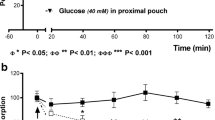Summary
Pronounced and prolonged disfunction of the stomach results from the introduction of the dysentery bacillus antigen into isolated (by Pavlov's method) portions of the small and large intestine. This is due to the fact that the antigen not only stimulates the nervous apparatus of the intestine, but is also absorbed. Irrigation of isolated portions of the intestine by the Thiry-Vella method, which prevents absorption of the antigen (this was proved by experiments with labeled antigen) is also associated with disturbed function of the stomach, which, however, differs qualitatively. It was demonstrated on animals deprived of parasympathetic innervation of the stomach that the function is disturbed when the antigen is introduced into the isolated protions of intestes. This shows that the sympathetic innervation of the stomach and certain humoral factors take part in the influence of the intestine on the gastric function. Therefore, both the neuroflex mechanism and the humoral factors participate in interoceptive transmission from the intestine to the stomach.
Similar content being viewed by others

Literature Cited
A.D. Ado, in the book: Antigens as Special Stimulants of the Nervous System In Russian (Moscow, 1952).
K.M. Bykov, Cerebral Cortex and Internal Organs In Russian (Moscow-Leningrad, 1952).
L.F. Volkov, Zhur. Voenno-Med. 12, 29–34 (1954).
Z.M. Volynskii, Sovet Vrachebni Zhur. 5, 349–355 (1941).
I.S. Dergachev, Pediatriia 4, 14–20 (1954).
E.I. Zverev and A.D. Belova, Problems of Epidemiology, Prophylaxis, and Clinical Care of Intestinal Infections In Russian 229–269 (1954).
M.Ia. Korn, Studies on the Use of Radioactive Isotopes in Medicine In Russian, (Moscow, 1953).
K.M. Loban, Arch. Terap. 26, section 5, 41–47 (1954).
P.N. Stepanov, Chronic Dysentery In Russian (Sverdlovsk. 1946)
P.S. Chulkov, Trudy Voenno-Med. Akad. Leningrad. 4, 279–303 (1935).
V.P. Emaikina, Pediatriia 3, 44–50 (1952).
Dold and Fisher, I Abt. Originale 85, 3, 198–206 (1921).
R. Dold, Deutsche med. Wschr. 42, 811–813 (1916).
R. Schiga, op. cit. 27, 741–744 (1901).
Ibid., Zbt. für Bact. Parasitenkunde u. Infektionskrank. XXIV, 24, 913–918 (1898).
Author information
Authors and Affiliations
Rights and permissions
About this article
Cite this article
Brodskaia, E.A. Alterations in gastric function produced by the action of the antigen of the dysentery bacillus upon the intestinal mucous membrane. Bull Exp Biol Med 45, 445–449 (1958). https://doi.org/10.1007/BF00781253
Received:
Issue Date:
DOI: https://doi.org/10.1007/BF00781253


